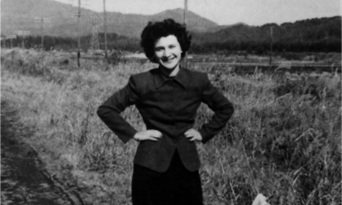“[She was] the woman who in February 1946 wrote the women’s clause of Japan’s new draft constitution, the impresario who for almost 40 years brought thoughtful, dazzling and original Japanese and Asian performing arts to American audiences”
– Nassrine Azimi

Beate Sirota Gordon in Japan in 1946
Beate Sirota Gordon (1923-2012) was a long-unsung heroine of Japanese women’s rights, having written them into Japan’s post-World War II Constitution. First at the Japan Society and then the Asia Society, she worked tirelessly to introduce North American audiences to authentic and traditional artists from across Asia.
Beate (pronounced bay-AH-tay) was born in Vienna to Leo Sirota, the renowned Ukranian concert pianist, and the former Augustine Horenstein on 25 October 1923. The family moved to Tokyo when Beate was 5, where her father taught at the Imperial Academy of Music and she absorbed both Japanese language and culture. In 1939, just before she turned 16, Beate left for Mills College in Oakland, Calif. while her parents remained in Japan.
In December 1941, the attack on Pearl Harbor made it impossible for Beate to contact her parents, leaving her alone with no financial support. While still a student at Mills, Beate put her foreign language skills (she was fluent in English, Japanese, German, French, Spanish, and Russian) to use, monitoring radio broadcasts from Tokyo for a United States government listening post in San Francisco. At that time, she was one of 100 Caucasians in the entire United States who were fluent in Japanese. She graduated from Mills College in 1943 and became a naturalized US citizen in 1945.
When WWII ended, she still did not know whether her parents were alive or dead. Beate joined General MacArthur’s staff as an interpreter, and arrived in a devastated Tokyo on Christmas Eve, 1945. She found her parents malnourished but safe, having been interned in the countryside.
Beate was the only female assigned to MacArthur’s top-secret constitutional committee, charged with drafting Japan’s post-war constitution in just 7 days, a task which the Japanese government had failed to accomplish twice. As “the only woman in the room”, she was tasked with composing the section on women’s rights. She produced what became Article 24 of the Constitution of Japan:
“Marriage shall be based only on the mutual consent of both sexes and it shall be maintained through mutual cooperation with the equal rights of husband and wife as a basis. With regard to choice of spouse, property rights, inheritance, choice of domicile, divorce and other matters pertaining to marriage and the family, laws shall be enacted from the standpoint of individual dignity and the essential equality of the sexes.”
Growing up she saw how women were treated in Japan; they were usually married to men they did not know, could inherit nothing, and could even be bought and sold like chattel. Beate understood the importance of having women’s rights recognized in the Constitution itself, and fought to preserve Article 24 in spite of protests from the Japanese negotiators. The 25-year oath of secrecy imposed upon the committee members kept her contributions to women’s rights unknown for decades.
